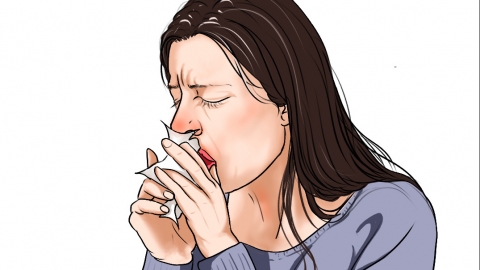Why has the cough persisted for almost a month after contracting influenza A, and what should be done?
Generally speaking, "A flu" refers to influenza A. Influenza A is a respiratory infectious disease caused by the influenza A virus. If coughing persists for nearly a month after contracting influenza A, it may be caused by habitual coughing, the respiratory tract's healing process, residual virus, bronchitis, pneumonia, or other reasons. Treatment options may include general care and medication under a doctor's guidance. If coughing persists after influenza A, timely medical consultation is advised to identify the cause of the cough and follow medical instructions for treatment. Detailed explanations are as follows:

1. Coughing Habit
Prolonged coughing may form a conditioned reflex, continuing even after the original cause has been resolved due to habitual actions. This can be improved through deep breathing exercises or psychological counseling.
2. Respiratory Tract Healing Process
After infection with the influenza A virus, the respiratory epithelial cells require time to heal. During this process, excessive secretions may develop, stimulating the cough reflex and resulting in persistent coughing. Drinking plenty of water, ensuring adequate sleep, and consuming foods rich in vitamin C can help promote tissue repair.
3. Residual Virus
The influenza A virus may remain in the respiratory tract for an extended period, leading to ongoing inflammatory responses and coughing. Even after most of the virus has been cleared, the respiratory tract still needs time to recover. Patients may follow medical advice to use antiviral medications such as oseltamivir phosphate granules, compound amantadine tablets, or ribavirin granules to suppress residual virus.
4. Bronchitis
Bronchitis is usually caused by viral or bacterial infections. After infection with the influenza A virus, the virus may spread to the bronchi, causing bronchitis and resulting in persistent coughing. Symptoms may also include sputum production and wheezing. Patients are advised to use ambroxol hydrochloride oral solution, acetylcysteine granules, or carbocisteine tablets as directed by a physician, and ensure adequate rest and hydration.
5. Pneumonia
Pneumonia is typically caused by bacterial infection, viral infection, or a combination of both. Following influenza A, if the virus is not controlled promptly, pneumonia may develop. Inflammation affects the lung tissue, causing increased exudate in the alveoli, which stimulates coughing. Symptoms may also include fever, chest pain, and difficulty breathing. Patients may follow medical advice to use medications such as levofloxacin tablets, compound methoxyphenamine capsules, or paracetamol tablets for treatment.
Daily recommendations include ensuring adequate sleep and rest to enhance immunity and promote recovery.







